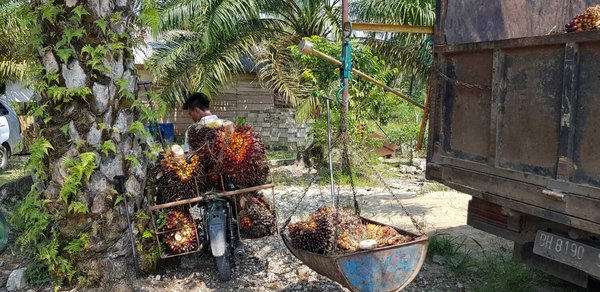 Read this article in French
Read this article in French- Share this article
- Subscribe to our newsletter
Making palm oil production more sustainable
Palm oil is often associated mainly with the logging of tropical rainforests. However, this is just one side of the coin. The broad expansion of oil palm cultivation has also contributed significantly to economic growth and fighting poverty, particularly in Asia, as researchers at the University of Göttingen (Germany) and IPB University Bogor (Indonesia) reported in May 2020. They analysed the results of research into the ecological, economic and social effects of oil palm cultivation in Africa, Asia and Latin America.
Oil palms deliver high yields per hectare
In some regions of the world, and particularly Indonesia and Malaysia, palm oil production is a major driver of rain forest logging and biodiversity loss. The clearing also results in high CO2 emissions and other ecological problems.
However, as oil palms produce more than three times as much oil per hectare as, for example, soy, rapeseed or sunflowers, it would not be a sustainable solution to ban production or trade in palm oil, according to the researchers. This is because completely replacing palm oil with other plant oils would require significantly more area under cultivation, so that additional forest and natural areas would have to be turned into arable land.
Around half of the palm oil used worldwide is produced by small farmers
Banning palm oil would also have adverse economic and social effects in the producer countries. Around half of the palm oil used worldwide is produced by small farmers. Oil palm cultivation significantly boosts the income of these small farmers, leading to more employment and higher income for the families of agricultural labourers, the researchers say.
They report that although there are also conflicts over land rights in several regions, the oil palm boom has significantly reduced rural poverty overall in Indonesia and other grower countries.
Making palm oil production more ecofriendly and climate friendly
As a result, the researchers call for making palm oil production more ecofriendly and climate friendly. Developing and implementing more sustainable production systems challenges both researchers and politicians. Clear and fair land rights and access for small farmers to consulting, credits and modern technology are important prerequisites. Consumers can also help by greater awareness when consuming food, cosmetics and fuels which contain plant oils and avoiding waste, the researchers say.
(University of Göttingen/ile)
Original publication:
Qaim, M., Sibhatu, K.T., Siregar, H., Grass, I. (2020). Environmental, Economic, and Social Consequences of the Oil Palm Boom. Annual Review of Resource Economics 12





Add a comment
Be the First to Comment